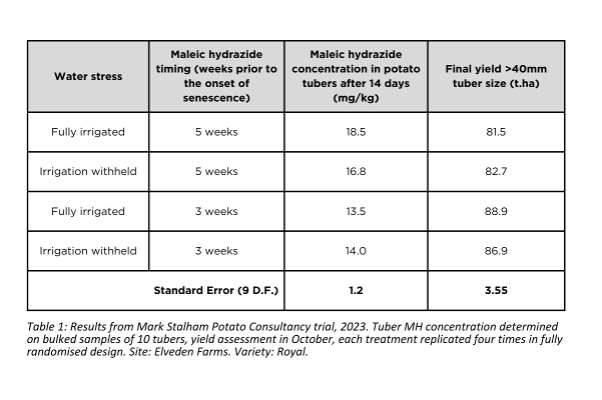In the world of potato farming, ensuring crops stay dormant during storage is crucial for maintaining quality and maximising profitability. Maleic hydrazide (MH), FAZOR, has long been a staple for controlling volunteer growth. However, with the phase-out of CIPC (chlorpropham), the spotlight on FAZOR (MH) has intensified, necessitating a deeper understanding of its application for effective sprout control.
Unveiling Insights from Extensive Research
Dr. Mark Stalham, in collaboration with CUPGRA and UPL, has conducted comprehensive research spanning multiple seasons from 2020 to 2023. This research not only revisited past studies but also conducted new field trials to refine our understanding of MH's effectiveness in potato storage.
"MH has been around since the 1960s, primarily used alongside CIPC for volunteer control," explains Dr. Stalham. "However, with the loss of CIPC, the focus has shifted significantly towards optimising MH applications for in-store sprout control."
Key Findings and Recommendations
Get the Timing Right According to Variety
One of the critical factors Dr. Stalham emphasises is timing. The ideal window for MH application begins approximately five weeks before senescence sets in. This timing ensures optimal uptake and distribution of MH within the tubers, crucial for effective sprout suppression.
"We're aiming for MH levels between 12-14 parts per million (ppm) in tubers," notes Dr. Stalham. "Applying too early or too late can reduce its efficacy, impacting crop yield and storage longevity."
Apply MH Strategically
Dr. Stalham recommends applying MH in the evening when humidity levels are higher, facilitating better absorption into the potato canopy. This strategy maximises the translocation of MH within the plant, enhancing its effectiveness against sprouting.
"Applying MH alone, separate from other treatments like blight sprays, ensures its efficacy isn't compromised," advises Dr. Stalham. "This dedicated approach targets sprout control effectively without dilution or interference."
Optimise Tubers for Maximum Effect
Size matters when it comes to MH absorption. Dr. Stalham's research highlights that larger tubers tend to absorb and retain MH more effectively than smaller ones. Therefore, grading out tubers smaller than 45 mm ensures uniform MH levels across stored batches, preventing premature sprouting.
"Smaller tubers are more prone to breaking dormancy early due to lower MH levels," explains Dr. Stalham. "By focusing on larger, more absorbent tubers, growers can extend storage periods significantly."

The Role of In-Store Sprout Control Products
Geoff Hailstone, UPL's potato technical lead, emphasises the importance of choosing the right in-store sprout control products to complement MH applications. Products like ARGOS, which utilise contact activity to suppress sprouts physically, maximise the benefits of MH's dormancy-inducing properties.
"ARGOS effectively targets sprouts upon detection, complementing the natural dormancy maintained by MH," says Geoff. "This approach leverages the crop's inherent defences while extending storage durations without additional treatments."
To Wrap Up
As potato growers navigate the complexities of post-CIPC agriculture, MH emerges as a pivotal tool for managing sprout control effectively. Dr. Stalham's research highlights the importance of precise timing, strategic application methods, and complementary in-store strategies to maximise MH's potential.
"Getting MH applications right isn't just about saving costs; it's about ensuring potatoes retain their market value and quality throughout storage," concludes Dr. Stalham. "With careful planning and adherence to these insights, growers can achieve extended storage durations and enhanced profitability."
Incorporating FAZOR (MH) into your agricultural practices isn't just a matter of routine—it's a strategic decision that can redefine your storage outcomes.
For more information on optimising FAZOR applications and enhancing sprout control strategies, get in touch with our experts at UPL today.
